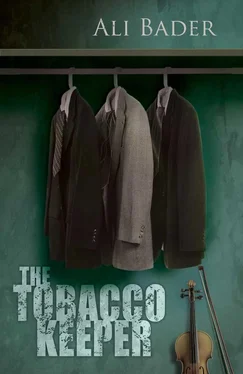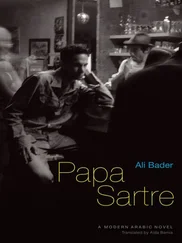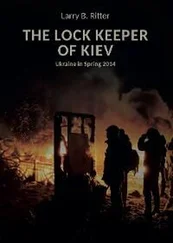We arrived at noon. When we entered Jabbar’s room, we were absolutely dumbfounded. It was a complete archive, catalogued and systematically arranged. Once you gave the name you were looking for, he would search and bring you the papers, all for a price, of course.
We sat in wicker chairs. An old rug covered the yellow-tiled floor. Jabbar was a handsome young man of medium height who spoke with a hint of sarcasm. He sat at a wooden desk stolen from some government office, on top of which was a small Iraqi flag. On the wall behind, instead of the president’s picture, hung a photograph of his father. The caption beneath it read: ‘Photograph of my father. May God preserve and protect him’. Funnily enough, this was the same dedication as the one on Saddam’s photographs. This was just a small office in Baghdad that sold documents. Because of frequent power cuts, the windows and curtains were kept open. On the right he’d placed a lantern on a piece of black vinyl, and on a small low table he’d placed his hookah, filled with aromatic tobacco and from which he inhaled and then slowly blew out the smoke.
We asked him about the file of Kamal Medhat.
He was well organized, and had a list of all the names for which he possessed files. He looked at the index, then got up and went to the files stacked behind him. He picked up a file, flipped through it and returned it to its place. Then he took hold of another one, nodded and handed it to me.
I took the file and flipped through its pages. I read his name. I scanned the official notes and the security-service observations about his character. I could have jumped for joy. Faris Hassan began to haggle over the price. I had no wish to listen to Faris bargaining about a price that was no more than the cost of a pair of trousers or a shirt. I asked him to pay the man so that I could get on with my work.
We went down two or three steps and walked through the street’s rubbish dump. We stepped on dead cats, an appalling stench filling our nostrils.
We got into the minivan and went straight to Kamal Medhat’s house in Al-Mansour.
Most of the material in the file consisted of reports or summaries of reports, some of which were general in nature while others were personal. Only one report really shocked me. Iraqi intelligence had known that he was one of those Iraqis who’d been expelled as an Iranian subject and that he’d gone to Damascus and married Nadia al-Amiry. It was on the record that he’d then arrived in Baghdad and worked with the National Symphony Orchestra. The most important aspect of the report was the security responses given in support of his arrest or interrogation. Some of the documents recommended keeping him under constant surveillance. One important report discussed his relationship with Widad and other private matters. There was also a report on his affair with Janet, for the reports weren’t limited to his political attitudes, which categorized him as a free liberal. The word ‘free’ meant that he had no political affiliations nor any connections with religious movements. Among all the reports was one written by Widad, which had been submitted to a security investigation. She’d recommended him highly and defended him staunchly.
The question is: Did Kamal Medhat know that the state was aware of his previous incarnation? I doubt it.
The artist’s house in Al-Mansour
His house in Al-Mansour stood a mere two hundred meters from the statue of Abu Jaafar al-Mansour, the second Abbasid Caliph. The house had a beautiful brick façade and high windows in the style of the seventies. When Faris and I entered, we went through a corridor that led us straight to the library that was packed with books. In front of the dining table was a teak cupboard, which was used for household utensils. On some of the shelves, however, he’d also placed more books, while there was a stack of novels on the floor. There was also a table near the chair in which he used to sit looking out of the window. I found two books on the table. The first was the memoirs of the French violinist Stéphane Grappelli and the second was a selection of poems by the Portuguese poet Fernando Pessoa, translated into English under the title Tobacco Shop . The book was open at the poem called Tobacco Shop and was filled with explanatory notes written in pencil by Kamal Medhat. It’s clear that he’d depended on more than one book in his commentary on the poem. I didn’t pay much attention to this at the time, but I took the book and the pencil with me when I left.
There were many newspapers in the bedroom. It was clear that he’d spent most of his time in the dining room. But the door leading to the sitting room at the back remained shut throughout the days of the war.
There was a photograph of a fifty-year-old Nadia al-Amiry, looking beautiful with her blonde hair in two plaits that she curved around her ears. She wore a dark blue blouse and had put a ball of wool on the table. She was half-hidden behind the teapot. Kamal was standing close by with his plastic-rimmed glasses, his light beard and his sad eyes behind semi-dark lenses, smiling at her. Nadia al-Amiry herself looked straight ahead. Kamal Medhat was slightly stooped over the book he was absorbed in reading. With his grey hair and huge hands, he looked more like a worker than a musician.
My mobile phone rang. It was Faris. He said that he’d managed to locate Fawzeya, who was living in Al-Wishash City, the poor district right behind Al-Mansour City.
‘How do we get to her?’ I asked him.
‘Easy. I arranged a meeting with her at ten in the morning.’
The taxi came on Thursday morning. He said we had to wait for an hour or two, until we heard the explosion, before setting off. But I ran out of patience as we sat in the living room waiting for something to happen. Since nothing occurred, we started on our way. Near the bridge we heard the sound of the explosion and our legs shook.
We had to cross the bridge towards Al-Karkh. This was no easy matter, for nobody could predict what would happen. We didn’t know what our fate would be this time. After crossing Al-Jumhuriya Bridge in the direction of Al-Karkh, I was overwhelmed by a strange feeling, a mixture of depression and regret. I wondered what had brought me there and why I’d accepted this assignment in the first place. At that moment, it wasn’t the fear of death that was uppermost in my mind, but the terror of the torture I might be submitted to.
We reached a poor neighbourhood located right next to a classy district. There were some low buildings standing close to some small farms, in the middle of which ran a canal. It wasn’t easy to enter the city. There were potholes and barricades, as well as a group of armed men with rifles. Faris got out of the car and talked to them. He gave them a piece of paper he’d obtained the day before. It was a letter from a militia leader describing the importance of our mission and requesting them to allow us in.
I don’t know if he actually offered the militia leader money to facilitate the mission, but Faris had included a sum of money in the budget. We then walked along the street. Stagnant water filled the potholes that had taken over the street. The houses standing behind the wealthy district of Al-Mansour graphically illustrated the gulf separating the classes. The militias of the poor Sunni and Shia areas were fighting over Al-Mansour, which was inhabited by the middle and upper classes.
We stopped in front of a very poor house whose façade had been practically destroyed, and knocked on the door. Fawzeya came out to greet us, wearing a wide pair of trousers and a black shirt. She’d covered her hair with a scarf. She lived with three of her sisters and her mother on the salary provided by Kamal Medhat. She was grieving, but was one of our most important sources of information.
Читать дальше












